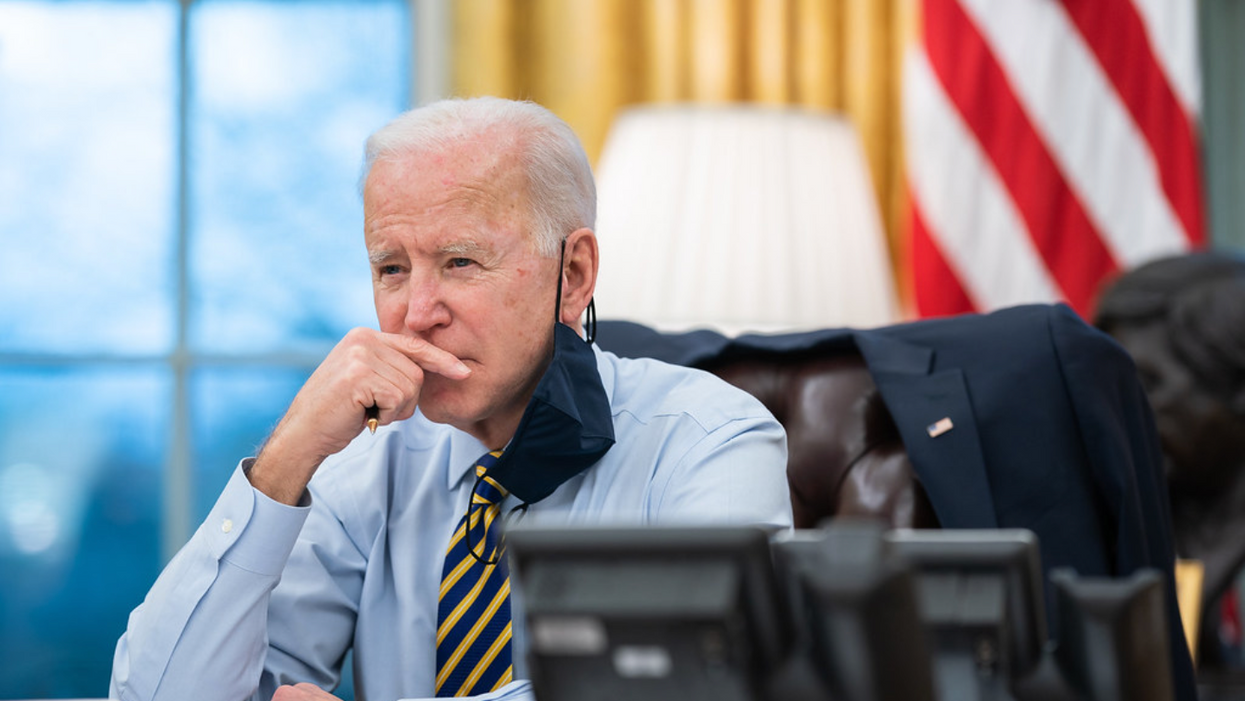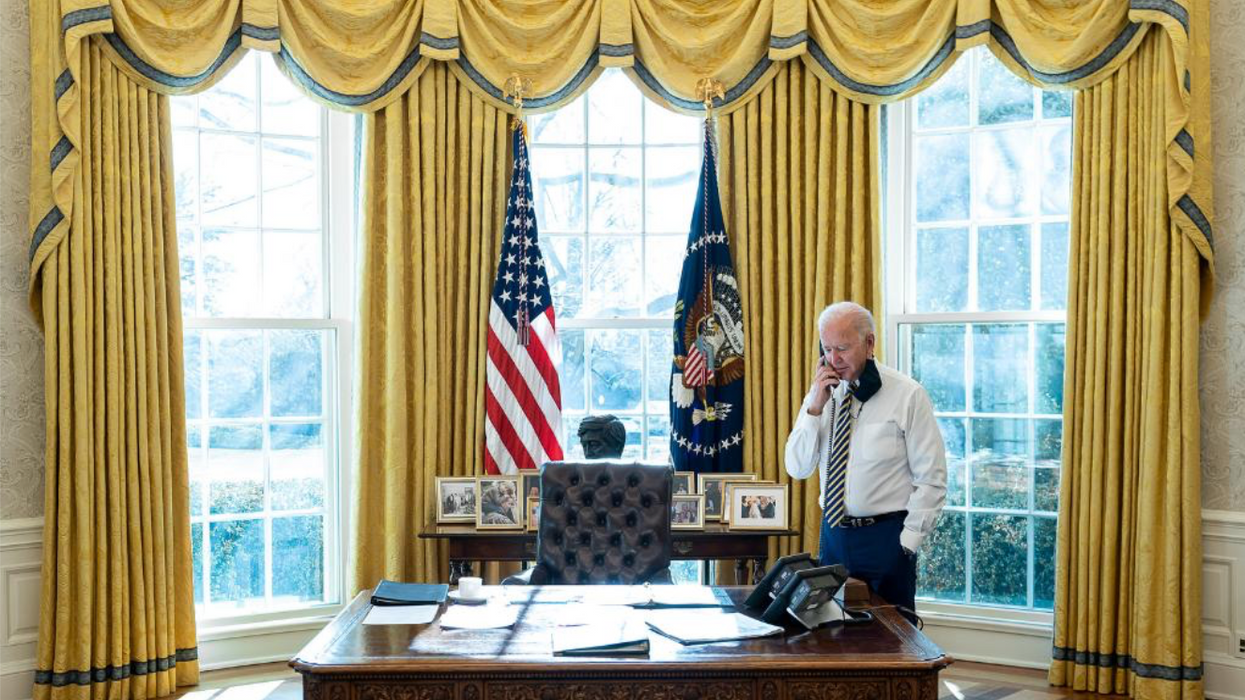Following Backlash, Biden Offers Reassurance On Refugee Admissions Limit
Reprinted with permission from American Independent
The White House was forced to issue an explanation on Friday following strong backlash to President Joe Biden's emergency presidential declaration leaving in place a Trump-era refugee admissions cap of just 15,000, despite promising months earlier to raise it to 62,500 for the rest of the fiscal year.
"For the past few weeks, [the president] has been consulting with his advisors to determine what number of refugees could realistically be admitted to the United States between now and October 1," press secretary Jen Psaki wrote. "Given the decimated refugee admissions program we inherited, and burdens on the Office of Refugee Resettlement, his initial goal of 62,500 seems unlikely."
Still, she insisted, "While finalizing that determination, the President was urged to take immediate action to reverse the Trump policy that banned refugees from many key regions, to enable flights from those regions to begin within days; today's order did that. With that done, we expect the President to set a final, increased refugee cap for the remainder of this fiscal year by May 15."
The statement was met with cautious praise from lawmakers like Rep. Veronica Escobar (D-TX), who tweeted, "While I'm heartened to learn that @POTUS still intends to increase the number of refugee admissions, I urge the admin. to move with urgency and communicate with clarity. Protecting the most vulnerable seeking a safe haven is who are, it's at the heart of our nation's values."
The Center for American Progress, a progressive think tank based in Washington, D.C., also said in a statement, "The United States is at its best a beacon of freedom for those facing persecution around the world, setting the standard for refugee resettlement that the rest of the world watches and emulates. In this light, we are disappointed by the Biden administration's reticence to follow through on its commitment to raise the admission levels immediately, instead maintaining the previous administration's record-low admissions cap."
"We hope this action will be reversed, even as we appreciate the effort to end the discriminatory admissions categories that left vulnerable refugees in limbo," the organization added.
Lawmakers and immigration groups had expressed outrage on earlier Friday, after Biden issued the emergency presidential declaration, with many of them pointing to the president's prior pledge and others questioning his administration's reasoning justifying the move.
"There simply is no courage or political wisdom in breaking this American promise. Maintaining a cruel policy of the past will have a vast human impact on people fleeing war and persecution. This decision is ultimately an unnecessary policy and political misstep," the Immigration Hub, an advocacy nonprofit, said in a statement.
Rep. Ilhan Omar (D-MN), a refugee herself who came to the United States as a child, slammed the move, tweeting, "As a refugee, I know finding a home is a matter of life or death for children around the world. It is shameful that @POTUS is reneging on a key promise to welcome refugees, moments after @RepSchakowsky @RepJayapal, myself and others called on him to increase the refugee cap."
Omar was referring to a letter that she, along with Reps. Pramila Jayapal (D-WA) and Jan Schakowsky (D-IL), wrote to Biden earlier on Friday, calling on him to follow through with his promise to up the refugee admissions cap to 62,500. More than 30 members of Congress signed the letter, including Rep. Alexandria Ocasio-Cortez (D-NY), who tweeted separately, "Completely and utterly unacceptable. Biden promised to welcome immigrants, and people voted for him based on that promise."
Jake Sullivan, Biden's national security adviser, responded to the backlash quickly, tweeting on Friday, "America needs to rebuild our refugee resettlement program. We will use all 15,000 slots under the new Determination and work with Congress on increasing admissions and building back to the numbers to which we've committed."
Psaki also issued a statement, saying the declaration was the first of many steps the administration would take to improve refugee admissions overall.
"This is just the beginning. This step lifts the restrictions put in place by prior Administration on where refugees can come from. We need to rebuild resettlement program and we are committed to continuing to increase refugee numbers," she tweeted.
A Biden administration senior official told the New York Times, however, that an uptick of unaccompanied minors crossing the U.S.-Mexico border — which Republicans have eagerly deemed a crisis — had created growing concerns within the administration, and that the immigrant children were too much for the already-overwhelmed refugee branch of the Health and Human Services department.
"The surge of migration at the border required us to ensure HHS/ORR (Health and Human Services/Office of Refugee and Resettlement), which is responsible for both unaccompanied children and refugee resettlement, had resources to adequately handle both," a senior administration official separately told the Hill.
However, as the New York Timesnoted, immigrants seeking asylum at the border are processed through a separate system than those applying for admissions from abroad. There's also a distinctly separate processing system for unaccompanied immigrant children and refugees overseas.
"The Office of Refugee Resettlement is responsible for sheltering migrant minors who cross the border but has a separate budget line for assisting refugees who come from overseas," the Times wrote. "The State Department also is the agency that assists refugees for the first three months after their arrival.
According to the Office of Refugee and Resettlement's website, the U.S. Refugee Resettlement Program is indeed separate from the Unaccompanied Children Program.
The refugee program serves those fleeing persecution from other countries, while the unaccompanied minors program aids children who have already arrived and approached any U.S. border.
The Biden administration also announced Friday that it would speed up refugee admissions while rebuilding the program that the Trump administration depleted, allowing in refugees from areas of the world previously de-prioritized by Biden's predecessor.
That wasn't nearly enough to quell dissatisfaction among refugee advocates, like David Miliband, president and chief executive of the International Rescue Committee, who told the Times, "The rightful erasure of discriminatory admissions categories does not dispense with the need for a higher number of refugees to be admitted."
For now, Biden is expected to keep his promise to raise the refugee admissions ceiling to 125,000 for fiscal year 2022, the highest in 30 years. But the decision to keep the current cap in place has left a sour taste in many people's mouths.
"Trump gutted our refugee program, a cornerstone of our global leadership and values," Julián Castro, former presidential candidate and secretary of Housing and Urban Development under Obama, tweeted Friday afternoon.
"His polices can't be the default we carry on—especially for the sake of 'optics.'"
Updated to include additional comments from the Center for American Progress.
Published with permission of The American Independent Foundation.










